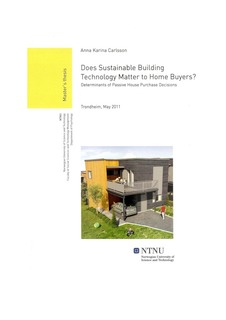Does Sustainable Building Technology Matter to Home Buyers?: Determinants of Passive House Purchase Decisions
Master thesis
Permanent lenke
http://hdl.handle.net/11250/270694Utgivelsesdato
2011Metadata
Vis full innførselSamlinger
- Institutt for psykologi [3143]
Sammendrag
The objective of this study was to explore what determines the decision of purchasing a passive house. Passive house projects are increasing in Norway, due to their energy saving potential, and an existing project in Trondheim was used as a case for this study. Exploring the determinants was done by interviewing people who had pur-chased a passive house, and asking what they focused on when deciding which house to buy. It was investigated to which extent the environmental aspect of passive houses influenced the purchase decision. Further, the study investigated if it was possible to distinguish different interest categories among the house buyers, based on economic, environmental or technological interest. Since passive houses are still within the earlier stages of diffusion, it was explored whether the buyers fit into the categories of inno-vators and early adopters, based on diffusion of innovation theory. If the passive house buyers showed environmental interest, the interest could be explained by the variables in the value-belief-norm theory.
Interviews and a questionnaire were used to survey the population of the case area and while it was a small sample, the results show that the passive house settle-ment is perceived more as a housing project in line with conventional projects than a technological innovation. The location, particularly in relation to distance to jobs, city centre and nature was the most important decision determinants. Additionally, limita-tions in the housing market determined the house choice. The sustainable feature of the passive house was not a determining factor, but was considered positive, mostly due to the long term economic benefit. This shows that the house choice was not guided by pro-environmental values, beliefs and norms. The buyers were not innovators/early adopters by their own choice, and expressed uncertainty about the technology.
